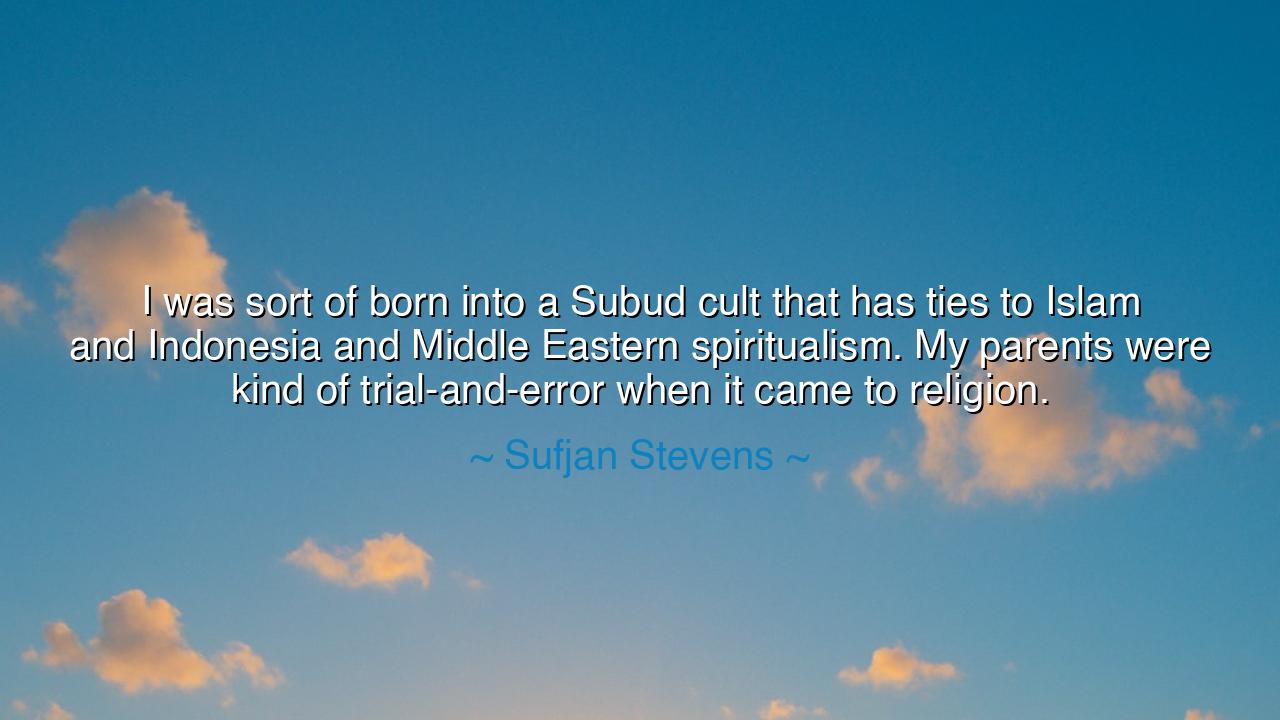
I was sort of born into a Subud cult that has ties to Islam and
I was sort of born into a Subud cult that has ties to Islam and Indonesia and Middle Eastern spiritualism. My parents were kind of trial-and-error when it came to religion.






“I was sort of born into a Subud cult that has ties to Islam and Indonesia and Middle Eastern spiritualism. My parents were kind of trial-and-error when it came to religion.” So confessed Sufjan Stevens, the wandering minstrel of the modern age, whose music shimmers with mystery, faith, and doubt alike. In these words, he opens a window not only into his own life but into the restless heart of humanity — that eternal search for meaning, for God, for a truth that binds the scattered fragments of the soul. His statement, though humble, resounds with the ancient ache of those who have sought the divine through confusion, through inheritance, and through the wilderness of belief.
To be born into a faith is both a gift and a burden. It is to awaken already surrounded by symbols, rituals, and voices proclaiming truth. Yet, as Sufjan reveals, faith that is inherited without understanding must one day be questioned — for the spirit cannot live forever on borrowed conviction. His parents’ “trial-and-error” with religion reflects the story of countless seekers across time: those who have wandered through temples, mosques, churches, and silent forests, tasting from each cup but finding no single drink that quenches the thirst for ultimate meaning. This journey is neither folly nor failure; it is the human condition itself — to seek what cannot be seen, to wrestle with the unseen currents of the soul.
The Subud movement, from which Sufjan’s spiritual lineage partly flows, began in Indonesia in the early 20th century under the mystic Muhammad Subuh Sumohadiwidjojo. Rooted in Islamic mysticism yet branching freely into universal spirituality, it taught surrender — the act of opening one’s inner being to the divine will without the mediation of creed or clergy. To grow up within such a current is to stand between worlds: one foot in faith, the other in uncertainty. It is a space of paradox, where devotion and doubt coexist, and where the search for truth becomes not a straight road, but a spiral ever returning to the self.
History is rich with souls who, like Sufjan, were born amid conflicting faiths and found illumination in their struggle. Consider Rumi, the Persian poet of love divine, who was nurtured in Islam yet embraced truths that transcended all religion. He said, “The lamps are different, but the light is the same.” Out of the turbulence of belief and questioning, Rumi discovered unity — that beneath the forms and rituals of religion, there beats one eternal heart: Love. Likewise, Sufjan’s art bears this same spirit; in his songs, we hear hymns and doubts intertwined, the sacred and the human meeting in tender harmony. His story is the story of all who wander through many gates before realizing that the temple of truth lies within.
This quote also speaks of the heritage of confusion, the way our parents’ spiritual experiments shape us. Many inherit not faith itself, but fragments of many — a mixture of psalms and mantras, prayers and silences. Yet even in that confusion there is beauty, for such souls become bridges between traditions. They learn compassion for all paths because they have walked more than one. They see that wisdom is not the property of one people or creed, but a shared flame carried by many hands. Thus, Sufjan’s experience teaches us that even spiritual chaos can be a divine classroom.
The deeper meaning, then, is this: to find one’s own relationship with the divine requires both inheritance and rebellion. One must honor the faith of one’s ancestors, yet not be bound by it. One must question bravely, for blind faith is not virtue but sleep. The trial-and-error of belief is not weakness — it is the courage to seek, the humility to not know, and the faith to continue searching even in the dark. For every truth worth finding is born first in uncertainty.
So, my child, learn from this: do not fear confusion, for confusion is the soil from which understanding grows. Let your faith be living, not inherited; tested, not assumed. Read many scriptures, but listen most deeply to your own conscience. Walk through temples, churches, and mosques — but know that the holiest shrine is the quiet space of your heart. Be like Sufjan — open to the winds of the spirit, unafraid to question, unashamed to feel. For in the end, as all the sages have found, it is not the name of your faith that sanctifies you, but the sincerity of your seeking.
And when your path feels uncertain, when the light seems distant, remember this truth: even trial-and-error is sacred if it leads you closer to love, humility, and wonder. Every belief you examine, every doubt you face, refines your soul. The journey itself — with all its wandering — is the prayer. And one day, in some quiet hour, you may realize that what you sought beyond all religions was never far away. It was the divine whisper within you, calling you home.






AAdministratorAdministrator
Welcome, honored guests. Please leave a comment, we will respond soon